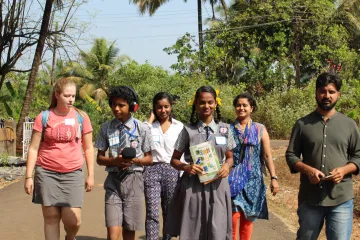Meet Dr. Devi Gopal

UArizona postdoc Dr. Shakuntala Devi Gopal has a clear vision for youth science education, stating that the future of science includes addressing socio-political dimensions and increasing access to STEM pathways. Dr. Devi Gopal is a first-year postdoctoral fellow in the Department of Educational Policy Studies & Practice. Her research centers on increasing equitable access to science education and developing culturally-relevant pedagogy. Her background in environmental science and conservation biology contrasts with her current research, exploring the relationship between science topics and socio-political issues. Thus, she has shifted to explore how science education can take on a decolonizing lens, seeking solutions so that the researchers of tomorrow can make socially conscious decisions within the STEM fields.

Dr. Devi Gopal used COVID-19 as an example of how science topics are entwined with socio-political issues. The COVID-19 vaccine (the science topic) required fast-tracked governmental intervention (the political issue), causing communities to discuss and decide if they wanted to get vaccinated (social issue). After the first year of the pandemic, she co-designed a summer program for a group of high school students from India and the US to discuss and compare how their communities dealt with the COVID crisis. This program asked the students to discuss “How has this issue been shaped by social inequities?” and “What is prioritized by policymakers versus community members?”. She described that this program increased the students’ understanding about how both socio-political and science issues are connected and dealt with differently around the world.
She describes how her current work is a continuation of generations of researchers who have worked to decolonize science pathways. One example of this effort is her work with the Coeur d'Alene Tribe in Idaho, developing science education programming that encourages critical dialogue. Additionally, she is researching how teachers can be socio-political communicators in the way that they explain science topics in the classroom. By addressing the socio-political dimensions of science through educational programs, she wants to show students that “...STEM research can be an avenue for liberation… a way to move towards equity in the world.”
